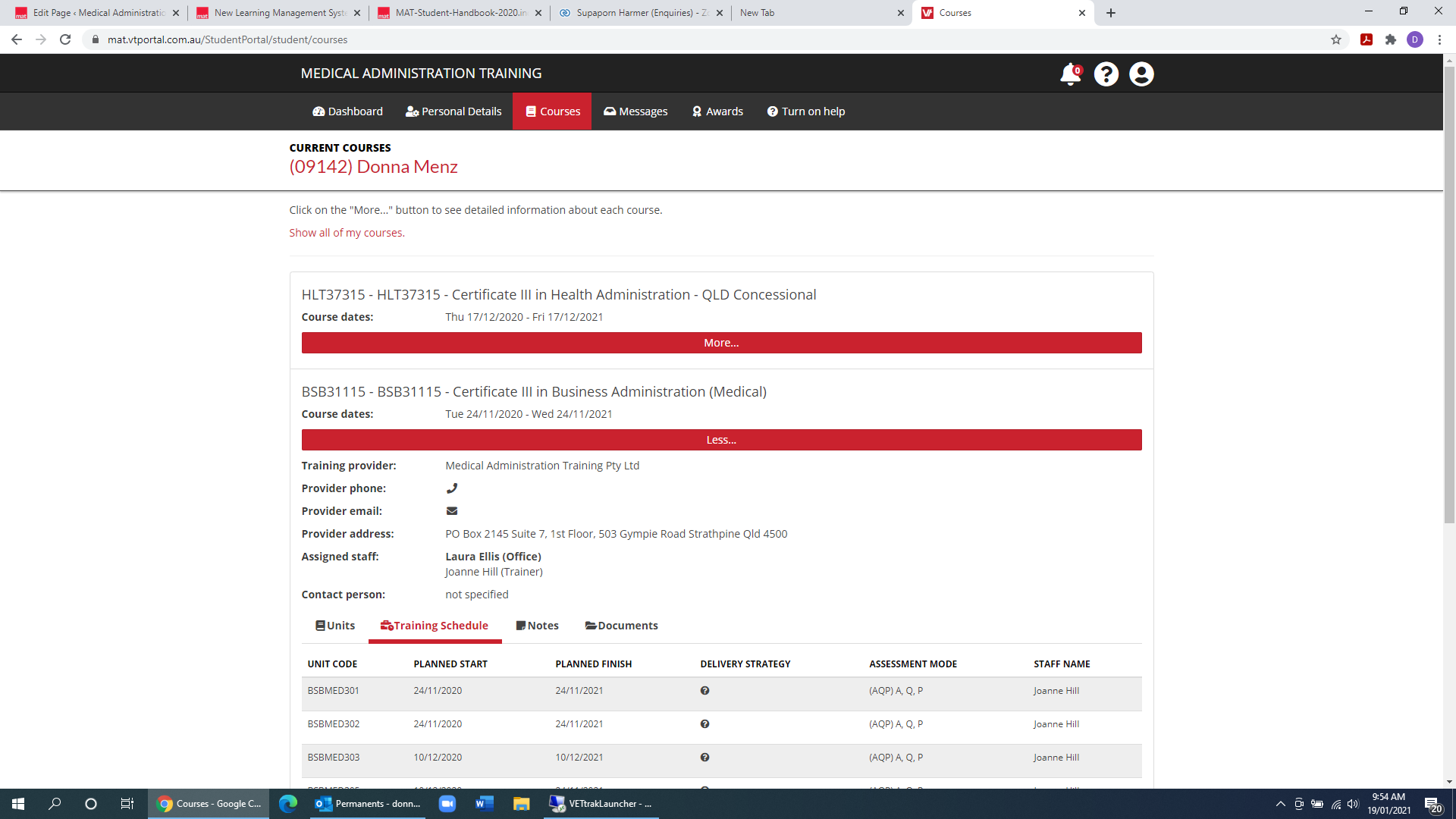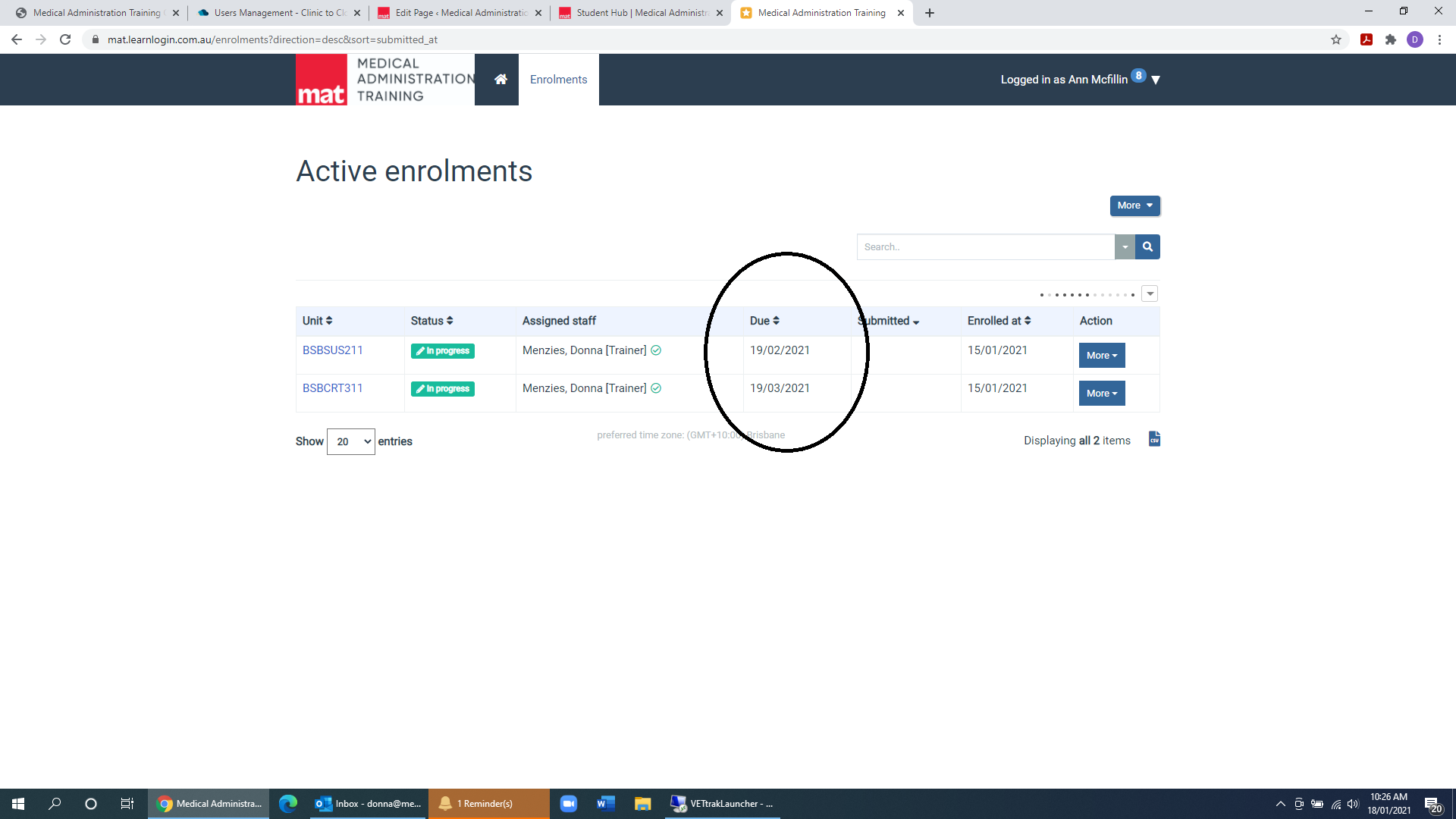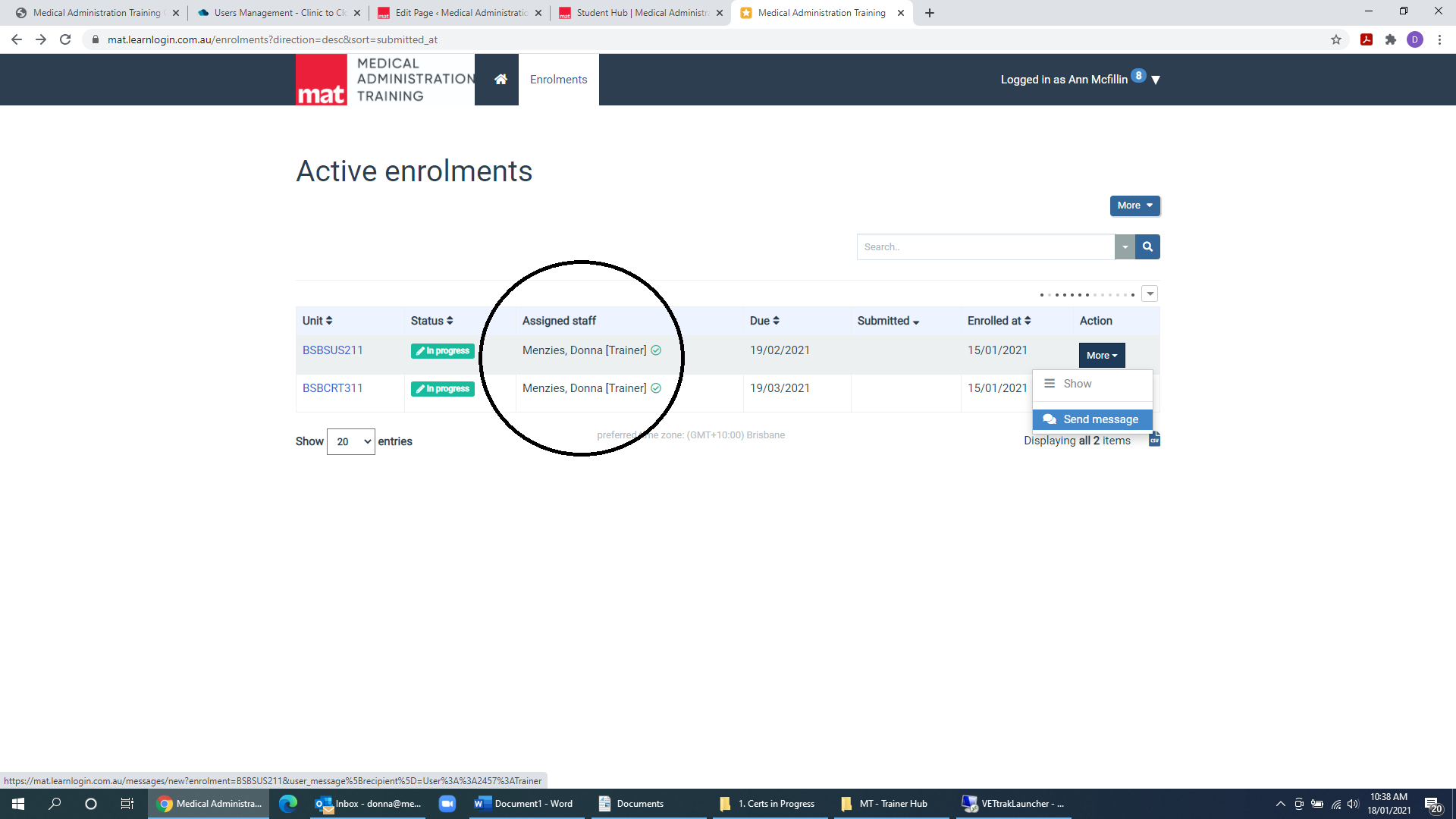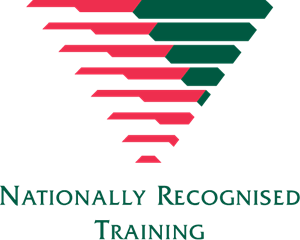Welcome to MAT!
These Frequently Asked Questions have been provided to assist you with completing your course and accessing assistance if required. Please ensure you read these before commencing your course.
The student portal gives you access to your enrolment information and documents. Put simply it is the administration side of your course. Your learning and assessment happens in a different program.
You login to this portal to view:
- DASHBOARD – Recently completed units
- PERSONAL DETAILS – Contact details we have on file for you. You must contact us to change this information.
- COURSES – Lists your course name, course start and end dates, provides a training schedule of your subjects and assessment due dates. Also contains documents such as your enrolment confirmation letter and invoice.
- MESSAGES – View recent emails and SMS messages
- AWARDS – View issued certificates
Students are provided with a confirmation of enrolment letter on commencement of their course. This letter provides course end dates.
In addition each student is provided access to the student portal. The course tab provides course dates and a training schedule. Each course has a set duration period however, you are welcome to complete sooner if you wish.
We understand that this might be your first time studying since leaving school, or you may have never completed online training before. You’ll find our Study Tips Guide full of top tips for effective study skills. Download the guide here.
You can log into the Learning Management System here:
Login to your eLearning site here
View the instructional video on how to move around the LMS here
View the assessment Instructional Video Here
If you have any concerns about completing any part of the assessment (including literacy and/or numeracy concerns), please talk to our support team before you start.
This is a standard system feature. Most assessment tasks only require you to type a response in the space provided, however some questions will ask you to record audio or video responses or upload documents for your trainer to review. You are only required to do this if the assessment question specifically asks for it.
Due dates are listed on the student portal training schedule and under enrolments listed on the learning management system. Please submit your unit on or before this date.
Assessments are marked in the order they are received and generally within 10 business days of submission date. To receive a satisfactory result for the assessments, participants must fully complete all sections of the assessment for the unit to the required standard.
Each assessment task has a section for the Assessor to record the assessment outcome as either “Satisfactory” or “Not Satisfactory”. For you to be awarded a competent result for the unit of competency, you must complete all assessment tasks satisfactorily.
Assessors must ensure that feedback is provided to you after each assessment, this may include asking you to reconsider some of your answers to the submitted responses and/or advice to broaden your understanding of the assessment task.
Once an assessment decision has been made for the unit of competency, the Assessor will complete the unit by recording either a “Competent” or “Not Competent” result.
You can appeal an assessment decision up to 30 calendar days after the decision. Assessment appeals can be made using the Complaints and Appeals policy and procedure.
Can I appeal a decision?
You can appeal an assessment decision up to 30 calendar days after the decision. Assessment appeals can be made using the Complaints and Appeals policy and procedure.
You should not:
- Complete assessment before reviewing the supplied learning materials
- Submit incomplete assessments
- Submit assessment that has been completed by someone else (not you)
- Submit assessment that has largely been sourced by searching the internet. You must not copy and paste large amounts of assessment answers directly off the internet.
We understand that the internet is a fantastic research tool and encourage our students to use it for this purpose. When asked to conduct research as part of forming your responses to assessment questions, you must cite the source(s) from which you gather your information. For example: Name of the author or organisation as well as the web address where you accessed the information.
You are permitted to paraphrase – meaning you can use someone else’s ideas and put them into your own words.
What is not accepted is copying and pasting assessment answers directly from the internet.
Our trainers check for plagiarism using online tools, all they have to do is type in a couple of short phrases from your assessment and hit search. As simple as that! Assessments received that have been largely completed by internet searching will not be marked and sent back to the student for a second resubmission within 14 days. The student may also receive disciplinary action from MAT.
Most of our assessments will require you to supply written responses and may use a range of ‘instructional words’, such as ‘identify’ or ‘explain’. These words will guide you as to how you should answer the question. Some questions will also tell you how many answers you need to give – for example, ‘Describe three strategies…’.
The following list will help you to provide correct responses:
- Analyse – when a question asks you to ‘analyse’, you should do so in detail, identifying important points and key features. Generally, you are expected to write a response of one to two paragraphs in length.
- Compare – when a question asks you to ‘compare’, you will need to show how two or more things are similar, ensuring you also indicate the relevance of the consequences. Generally, you are expected to write a response of one or two paragraphs in length.
- Contrast – when a question asks you to ‘contrast’, you will need to show how two or more things are different, ensuring you indicate the relevance or the consequences. Generally, you are expected to write a response of one or two paragraphs in length.
- Describe – when a question asks you to ‘describe’, you will need to state the most noticeable qualities or features. Generally, you are expected to write a response of two or three sentences in length.
- Discuss – when a question asks you to ‘discuss’, you are required to point out important issues or features and express some form of critical judgment. Generally, you are expected to write a response of one or two paragraphs in length.
- Evaluate – when a question asks you to ‘evaluate’, you should do so putting forward arguments for and against something. Generally, you are expected to write a response of one or two paragraphs in length.
- Examine – when a question asks you to ‘examine’, this is similar to ‘analyse’. You will need to provide a detailed response with key points and features and provide a critical analysis. Generally, you are expected to write a response of one or two paragraphs in length.
- Explain – when a question asks you to ‘explain’, you will need to make clear how or why something happened or the way it is. Generally, you are expected to write a response of two or three sentences in length.
- Identify – when a question asks you to ‘identify’, you will need to briefly describe the required information. Generally, you are expected to write a response of two or three sentences in length.
- List – when a question asks you to ‘list’, this means you will need to briefly state information in a list format, often with a specific number of items indicated.
- Outline – when a question asks you to ‘outline’, this means giving only the main points. Generally, you are expected to write a response of two or three sentences in length.
- Summarise – when a question asks you to ‘summarise’, this is similar to ‘outline’, only giving the main points. Generally, you are expected to write a response of two or three sentences in length.
You may be allocated different trainers throughout your course depending on the subjects you are studying. The trainers name is listed under assigned staff for each subject.
To message your trainer via the learning management system follow the below steps.
STEP 1 go to the enrolments tab
STEP 2 Find the subject you are working on
STEP 3 Click on the more action and press send message
(Please do not use the ‘Online Chat’ for student related enquiries)
1. Navigate to the MAT Learning Management System: https://mat.learnlogin.com.au/
2. Click the ‘Forgot your password’
3. Enter the Username (note: this is not your email address)
4. You will get an email with instructions on how to reset your password
Login to your eLearning site hereOn the next business day after you have successfully completed your current unit, our administration team will release your next unit.
Please email support@medtrain.com.au and request a dropbox folder.
Medical Administration Training takes plagiarism very seriously and it will not be tolerated. Plagiarism that is identified within a student’s assessment may lead to cancellation of their enrolment with no refund.
WHAT IS PLAGIARISM?
As a student you need to understand plagiarism, recognise when it happens in your own written work and know how to acknowledge the work of others correctly.
If you use another person’s work or words without full acknowledgement, you are plagiarising.
WHY DOES PLAGIARISM MATTER?
Plagiarism should not be considered a minor form of cheating, or just academic good manners, as it is a breach of academic integrity. It is fundamental for intellectual honesty that all members of the academic community do acknowledge their debt to the originators of the ideas, words, and data that form the basis for their own work.
Using another’s work as your own is bad practice, it means that you have failed to complete the learning process. Intentional plagiarism is unethical and can have serious consequences for your future career. It also undermines the standards of Medical Administration Training and its qualifications.
Medical Administration Training takes plagiarism very seriously and it will not be tolerated. Plagiarism that is identified within a student’s assessment may lead to cancellation of their enrolment with no refund.
TYPES OF PLAGIARISM
There are different types of plagiarism, and all are serious violations of academic honesty. We have defined the most common types below:
• Copying and pasting text directly from another document or website.
• Using Artificial Intelligence (AI) e.g., Chat GPT to answer assessment questions.
• Submitting work completed by another person or copying directly from another student.
• Using illegal cheating services – sometimes also called contract cheating services. These organisations sell students essays or assignments or accept payment for someone to sit exams on a student’s behalf. Often, these services market themselves as offering ‘study support’ or ‘assignment help’. Many of these illegal operators will ask students to upload previous work or material from their course to access the advertised ‘support’ and offer instant access to study resources, course notes, test prep, 24/7 homework help, tutors, etc. You will find information on the Australian Government Tertiary Education Quality Standards here: https://www.teqsa.gov.au/students/understanding-academic-integrity/identifying-avoiding-and-reporting-illegal-cheating-services
HOW TO AVOID PLAGIARISM:
You can avoid plagiarism by:
Using approved study resources: Use the learner resources supplied to you by Medical Administration Training, wherever possible.
Producing your own work: Never use cheating services and ensure that you submit assessments that are 100% completed by you and nobody else.
Presenting your own ideas: We understand that there may be times when you conduct your own research to answer an assessment question. Instead of directly copying and pasting the source’s information, ask yourself what unique perspective or point you can contribute to their ideas and write in your own words.
Citing your source: If on the odd occasion you allude to an idea or wording that’s not your own, add a citation in your assessment answer that identifies the full website of the source.
Avoiding AI: Never submit assessment that has been produced by Artificial Intelligence (AI). With the introduction of plagiarism checkers, we are able to easily identify work that has been plagiarised.
Abiding by copyright legislation: You must not share, publish, upload or reproduce any learning or assessment material provided to by Medical Administration Training.
PLAGIARISED WORK
Students are provided with one (1) warning for plagiarism. Students accept there will be a $50 re-submission fee per assessment after the 2nd submission that has been returned by a trainer to a student because of plagiarism or marked as not yet competent because of plagiarised work. Students accept that no assessments will be marked until the $50 fee is paid. Students who are warned about plagiarism and continue to submit work that is not their own will have their enrolment cancelled with no refund offered.
COLLUDING:
Students will not share, publish, upload or reproduce any material contained in Medical Administration Training or MAT Health Clinic learning or assessment content or similar. Use of these materials for a purpose which infringes on copyright is expressly forbidden and any person who commits such an infringement shall be personally liable under the Copyright Act. Students who share Medical Administration Training’s course material will have their enrolment cancelled with no refund offered.
You will find the Medical Administration Training Plagiarism Guidelines here.
Upon successful completion of your coursework and provided all fees are paid, a Certificate or Statement of Attainment will be issued to you within 30 calendar days of you being assessed as meeting all requirements for the course.
Please notify us as soon as possible of any changes to your contact details. Please note that updating your contact information in the eLearning site or student portal does not update on your student file so you will need to advise us either in email or by calling.
Medical Administration Training seeks to prevent complaints by ensuring high levels of satisfaction with its training and assessment, its performance as an RTO and with its public image. A copy of Medical Administration Training’s Complaints and Appeals Policy and Procedure can be found here. You will find our Complaints & Appeal Form here.
Starting a new course may be daunting. If you have any questions at all, please contact us. Here’s how you can get in touch with our team:
Student Support: support@medtrain.com.au
Administration: info@medtrain.com.au
To avoid our emails going to your spam/junk box we recommend adding our email addresses to your email contacts list.
Phone: 1300 887 082
(Please don’t use the ‘Online Chat’ for student related enquiries)




